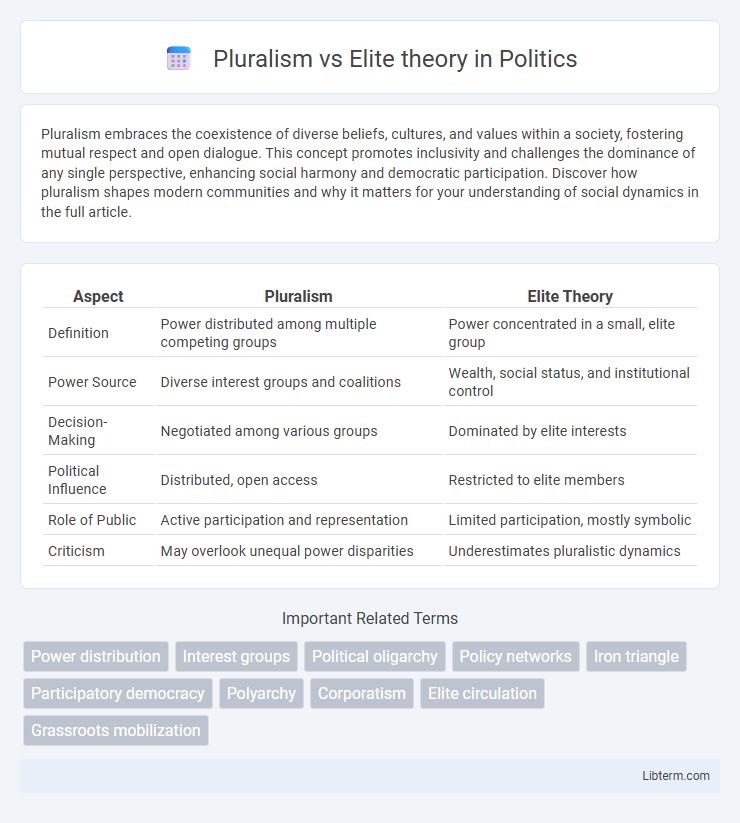Pluralism embraces the coexistence of diverse beliefs, cultures, and values within a society, fostering mutual respect and open dialogue. This concept promotes inclusivity and challenges the dominance of any single perspective, enhancing social harmony and democratic participation. Discover how pluralism shapes modern communities and why it matters for your understanding of social dynamics in the full article.
Table of Comparison
| Aspect | Pluralism | Elite Theory |
|---|---|---|
| Definition | Power distributed among multiple competing groups | Power concentrated in a small, elite group |
| Power Source | Diverse interest groups and coalitions | Wealth, social status, and institutional control |
| Decision-Making | Negotiated among various groups | Dominated by elite interests |
| Political Influence | Distributed, open access | Restricted to elite members |
| Role of Public | Active participation and representation | Limited participation, mostly symbolic |
| Criticism | May overlook unequal power disparities | Underestimates pluralistic dynamics |
Understanding Pluralism: Core Principles
Pluralism emphasizes the distribution of power among diverse interest groups, ensuring no single entity dominates the political landscape. Core principles include open competition, multiple centers of influence, and the belief that public policy results from bargaining among varied groups. This theory contrasts with Elite theory, which argues that a small, cohesive elite controls decision-making processes.
Defining Elite Theory: Main Concepts
Elite theory posits that society is controlled by a small, cohesive group of individuals holding concentrated power in political, economic, and social spheres. These elites possess disproportionate influence due to their wealth, status, expertise, or institutional positions, shaping policies and decision-making processes behind the scenes. Unlike pluralism's emphasis on widespread participation, elite theory highlights unequal access to power, suggesting that democratic systems often mask the dominance of privileged minorities.
Historical Origins of Pluralism and Elite Theory
Pluralism emerged in the mid-20th century as a response to the concentration of power, influenced by political theorists like Robert Dahl who emphasized the role of diverse interest groups competing within a democratic framework. Elite theory traces its roots to early 20th-century sociologists such as Vilfredo Pareto and C. Wright Mills, highlighting how a small, cohesive group controls a disproportionate amount of power regardless of democratic institutions. Both theories originated from critiques of power distribution but offer fundamentally different views on the accessibility and dynamics of political influence.
Key Proponents and Influential Thinkers
Pluralism is championed by political scientists like Robert Dahl and David Truman, who argue that power is distributed among multiple competing interest groups ensuring democratic balance. Elite theory is primarily associated with thinkers such as C. Wright Mills and Vilfredo Pareto, emphasizing that a small, cohesive elite controls key governmental and economic institutions. Both frameworks provide contrasting views on power distribution and influence within societies.
How Pluralism Shapes Democratic Processes
Pluralism shapes democratic processes by encouraging diverse interest groups to participate in policy-making, ensuring that power is distributed across multiple competing factions rather than concentrated in a single elite. This diffusion of power promotes broader representation and accountability, allowing minority voices to influence legislation and prevent domination by a select few. By institutionalizing negotiation and compromise, pluralism enhances the responsiveness and inclusivity of democratic governance.
Elite Theory and Power Concentration in Society
Elite theory emphasizes the concentration of power within a small, privileged group that controls key political, economic, and social institutions, shaping major decisions to serve their interests. This theory argues that despite democratic appearances, the elite maintain dominance through influence over policymaking, media, and resource allocation, limiting broad public participation. Power concentration under elite theory results in limited social mobility and reinforces systemic inequalities, challenging pluralism's notion of widely dispersed power.
Pluralism vs Elite Theory: Major Points of Contention
Pluralism argues that power is distributed among multiple competing interest groups, ensuring broad participation and preventing dominance by any single entity. Elite theory counters that a small, cohesive elite group holds centralized power, controlling major decisions and limiting genuine political competition. The core contention revolves around whether political power is dispersed among diverse groups or concentrated within a privileged few.
Case Studies: Real-world Applications and Evidence
Case studies in pluralism highlight the distribution of power across multiple interest groups, such as the influential role of lobbying organizations in U.S. politics demonstrated by the American Medical Association and National Rifle Association's successful policy impacts. Elite theory is exemplified by analyses of corporate elites' domination over economic and political decisions, as seen in C. Wright Mills' study of the "power elite" in mid-20th century America. Empirical evidence from both theories reveals contrasting power dynamics: pluralism reflects decentralized influence among competing groups, whereas elite theory underscores concentrated authority within a few interconnected individuals or institutions.
Criticisms and Limitations of Both Theories
Pluralism is criticized for underestimating the influence of powerful elites and overlooking inequalities in access to power. Elite theory faces limitations by overstating the homogeneity and unity of elites, neglecting internal divisions and the role of non-elite actors. Both theories struggle to fully account for the complexities of modern political systems, including the impact of globalization, media, and new forms of political participation.
Contemporary Relevance: Pluralism and Elitism Today
Pluralism remains relevant by emphasizing diverse interest groups' influence in democratic societies, ensuring multiple voices shape public policy. Elite theory highlights the persistent concentration of power among a small, interconnected group of political, economic, and social elites controlling key decisions. Contemporary political analysis integrates both perspectives to explain how grassroots participation coexists with elite dominance in modern governance.
Pluralism Infographic

 libterm.com
libterm.com